句型转换规则分类练习
- 格式:doc
- 大小:50.50 KB
- 文档页数:8
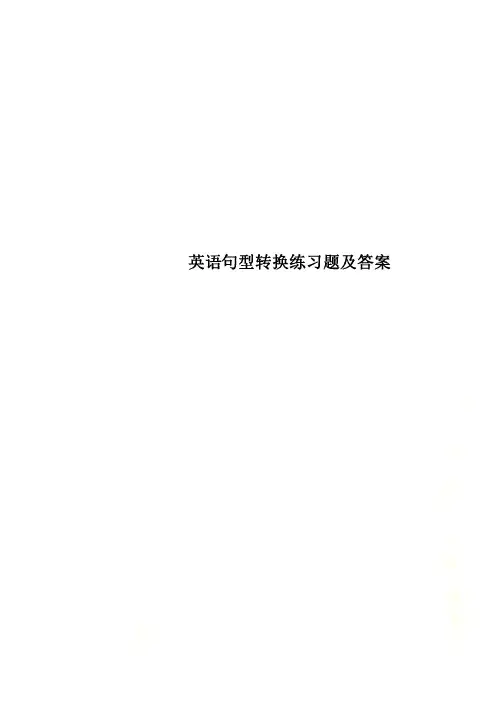
英语句型转换练习题及答案英语句型转换练习题及答案【篇一:初三英语总复习句型转换练习及答案】改写,每空一词(20分)1.this is the most boring journey that i have ever heard of.i have ________ heard of ________ a boring journey before. 2.my father seems to be very angry.________ seems that my father ________ very angry.3.the man made his baby laugh.the baby was ________ ________ laugh.4.the captain is the happiest of all the players.the captain is ________ ________ any other player. 5.taking exercise often can make you healthy.it’s good ________ your ________to take exercise often. 6.the children played happily in the zoo yesterday.the children ________ ________ in the zoo yesterday. 7.the problem is too difficult for me to work out.the problem isn’t ________ ________ for me to work out. 8.hurry up, and you’ll be on time for the party.________ you ________ hurry, you’ll be late for the party.9.it is five years since he left his hometown.he has ________ ________ from his hometown for five years.10.the film began at 2: 00 p. m. and ended at 4: 30 p. m. the film ________ two and a half ________.11.that lady is my new english teacher. she is wearing red clothes.the lady ________ ________ is my new english teacher. 12.with a polite good-bye, mr green left the house.________ ________ good-bye politely, mr green left the house. 13.i spent four hundred yuan in buying that recorder.that recorder ________ ________ four hundred yuan. 14.“can i borrow your bike?” he asked me.he asked me ________ i ________ ________ him the bike. 15.there are more people in america than in england.the ________ in america is ________than ________ in england. 16.he can’t decide where he should stay for the night.he can’t decide ________ ________ ________ for the night. 17.you needn’t thank me, sir.________ ________ ________ for you to thank me.18.the id card is not the only thing that i have lost.the id card is not the only thing ________ ________. 19.more and more people begin to love interesting travel. interesting travel is becoming more ________ ________________.20.his father has been dead for two years.it’s two years ________ his father ________.二、对下列句子的划线部分提问,每空一词(20分)1.the teachers had a meeting yesterday.________ ________ the teachers have a meeting?2.the postage is three yuan and six jiao.________ ________ is the postage?3.they helped the old lady clean her house once a week.________ ________ ________ they ________ the old lady clean her house?4.it’s going to be cloudy tomorrow.________ ________ the weather going to ________ ________ tomorrow?5.this suit costs 388 dollars.________ ________ ________ this suit cost?6.the students are planting trees on the hills now.________ ________ the students planting trees now?7.the meeting has been on for two hours.________ ________ ________ the meeting ________ on? 8.it’s july 1 today.________ ________ ________ ________ today?9.he has been to japan twice.________ ________ ________ ________ he ________ to japan? 10.i have learned french since last week.________ ________ ________ you ________ french?11.i will finish the work in half an hour.________ ________ ________ you ________ the work?12.it is two kilometers away from my home to the nearest hospital.________ ________ ________ it from my home to the nearest hospital?13.i didn’t go to see the film because i had seen it before. ________ ________ you ________ to see the film?14.his father often goes to school by bike.________ ________ his father often ________ to school? 15.my mother told me that she would buy me a new ruler. ________ ________ your mother ________ you?16.the dinosaurs are on show once a month.________ ________ are the dinosaurs on show?17.the weather is windy today.________ ________ the weather like today?18.mr green wants to travel by train.________ ________ mr green ________ to travel?19.they have been at our school since two years ago.________ ________ ________ they ________at our school? 20.the population of this city is 10 million.________ the population of this city?三、完成下列反意疑问句(5分)1.i’m late, ________ ________?2.there’s something wrong, ________ ________?3.there is nothing wrong, ________ ________? 4.someone went there, ________ ________?5.this isn’t a good pen, ________ ________?6.you’d better put on your coat, ________ ________? 7.let’s go to school, ________ ________?8.don’t open the window, ________ ________?9.what a clever boy, ________ ________?10.i don’t think you have done it, ________ ________?四、句型转换(55分)改为否定句)1.alice attends the lecture once a week. (alice ________ ________ the lecture once a week.改为被动2.we can store a lot of information in the computer. (语态)a lot of information ________ ________ stored in the computer.改为否定句)3.we have already read and written. (we ________ ________ ________ written ________.改为一般疑4.jack does some work on the farm every month. (问句)________ jack ________ ________ ________ on the farm every month?5.mike drew a picture on the blackboard. (改为被动语态)a picture ________ ________ on the blackboard by jack.改为被动语态)6.they couldn’t make the cow go. (the cow couldn’t ________ ________ ________ ________.改为感叹句) 7.the summer palace is a very beautiful park. (________ ________ ________ ________ the summer palace is! 8.there is some water in the glass. (改为否定句) there ________ ________ water in the glass. 9.they have learned english for three years. (改为一般疑问句) ________ they ________ english for three years? 10.the workers built the bridge five years ago. (改为被动语态) the bridge ________ ________ by the workers five years ago. 11.he doesn’t speak french. she doesn’t speak french, either. (用neither…nor 改写句子) ________ he ________ she ________ french. 12.the little boy spent two hours in doing his homework. (用it take sb. …句型改写句子) it ________ the little boy two hours ________ ________ his homework.用good改写为13.watching tv too much is bad for your eyes. (选择疑问句) ________ watching tv too much ________ ________ ________for your eyes? 14.something is wrong with the tv set. (用there be句型改写句子) ________ ________ ________________ ________ the tv set. 15.maths is important. english is important, too. (用as…as连成一个句子) maths ________________ important ________ english. 16.work hard, and you will pass the exam. (用if改写为复合句) ________ ________________ ________, you will pass the exam. 17.they are good用not only…but also改写at singing. they are good at dancing. (为简单句) they ________ ________ ________ good at singing________ ________ good at dancing.反意疑问句专练五.完成下列反意疑问句1.you’re a farmer, _______ ________?2.the weather isn’t fine, ________ ________?3.kate came here last month, _______ ________?4.i don’t think tom is at home, _______ ________?5.there weren’t enough nuts, ________ ________? 6.there’s a pen in the pencil-box, ________ ________?7.the man had bread for lunch, _________ _________?8.mary can speak little english , ________ _________?9.nothing is wrong with the watch, _______ ________?10.open the door, _______ ________?11.let’s be friends, _______ ________?12.let us go, ________ ________?13.i’m your good student, ________ _______?14.he must be at home, ________ ________?15.you’re going to have a meeting, ________ ________?16.the weather in china_______ very cold, isn’t _______?17.it’s summer in australia now, _ _____ ______?18.there is little water in the glass, __________ ________?19.jim knows the way australia speak, ________ ______?20.______ knows little about the weather in sydney,______ she?参考答案一、1.never; such 2.it; is 3.made to 4.happier than 5.for; health 6.enjoyed themselves 7.easy enough8.if; don’t 9.been away 10.lasted; hours 11.in red 12.after saying 13.cost me 14.if/whether; could lend 15.population; larger; that 16.where to stay 17.there’s no need 18.that’s missing 19.and more popular 20.since; died 二、1.when did 2.how much 3.how often did; help 4.what is; be like 5.how much does 6.where are7.how long has; been 8.what is the date 9.how many times has; been 10.how long have; learned 11.how soon will; finish 12.how far is 13.why didn’t; go 14.how does; go 15.what did; tell 16.how often 17.what is18.how does; want 19.how long have; been 20.what’s三、1.aren’t i 2.isn’t there 3.is there 4.didn’t they/he 5.is it 6.hadn’t you 7.shall we 8.will you9.isn’t he 10.have you四、1.doesn’t attend 2.can be 3.haven’t read or; yet 4.does; do any work 5.was drawn 6.be made to go7.what a beautiful park 8.isn’t any 9.have; learned 10.was built 11.neither; nor; speaks 12.took; to do 13.is; bad or good 14.there is something wrong with 15.is as; as 16.if you work hard 17.are not only; but also【篇二:中考英语句型转换练习题及答案】/p> 句型转换(5分)1.the movie is very exciting.(改为感叹句)_________________ exciting movie !(改为一般疑问句)2.there is some milk in the bottle._________ there ________ milk in the bottle?保持句意基本不变)we3.we had a good time last night. (________ ________ last night.(对划线部分提问)4.the girl eats little to make herself slim._________ _________ the girl eat little ?保5.tonny has ten story books. jimmy has five story books. (持句意基本不变) tonny has ________ books _______ jimmy.根据所给提示,完成句子。
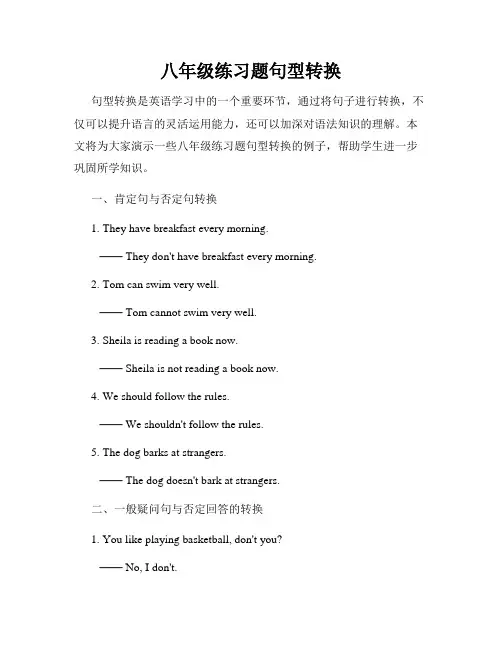
八年级练习题句型转换句型转换是英语学习中的一个重要环节,通过将句子进行转换,不仅可以提升语言的灵活运用能力,还可以加深对语法知识的理解。
本文将为大家演示一些八年级练习题句型转换的例子,帮助学生进一步巩固所学知识。
一、肯定句与否定句转换1. They have breakfast every morning.—— They don't have breakfast every morning.2. Tom can swim very well.—— Tom cannot swim very well.3. Sheila is reading a book now.—— Sheila is not reading a book now.4. We should follow the rules.—— We shouldn't follow the rules.5. The dog barks at strangers.—— The dog doesn't bark at strangers.二、一般疑问句与否定回答的转换1. You like playing basketball, don't you?—— No, I don't.2. He can speak Spanish, can't he?—— No, he can't.3. They have finished their homework, haven't they?—— No, they haven't.4. She likes listening to music, doesn't she?—— No, she doesn't.5. We should be careful, shouldn't we?—— No, we shouldn't.三、选择疑问句与肯定回答的转换1. Does he study English or French?—— He studies English.2. Is Mary going to the party or staying at home?—— Mary is going to the party.3. Did they go to the park or the beach?—— They went to the park.4. Are you going by car or by bus?—— I am going by car.5. Will she cook dinner or order takeaway?—— She will cook dinner.四、祈使句与否定祈使句的转换1. Close the door, please.—— Don't close the door, please.2. Be careful when you cross the road.—— Don't be careless when you cross the road.3. Read the instructions carefully.—— Don't read the instructions carelessly.4. Clean your room before you go out.—— Don't leave your room dirty before you go out.5. Study hard for the upcoming test.—— Don't slack off for the upcoming test.五、特殊疑问句与选择疑问句的转换1. What time does the train arrive?—— Does the train arrive at 10:00 or 11:00?2. Why did they cancel the meeting?—— Did they cancel the meeting because of bad weather or other reasons?3. Where can we find the information?—— Can we find the information on the website or at the library?4. How often do you go swimming?—— Do you go swimming once a week or twice a week?5. Who is playing the piano in the next room?—— Is it John or his sister playing the piano in the next room?通过以上例子,我们可以看到句型转换的练习可以涵盖肯定句与否定句、一般疑问句与否定回答、选择疑问句与肯定回答、祈使句与否定祈使句、特殊疑问句与选择疑问句等各种类型。
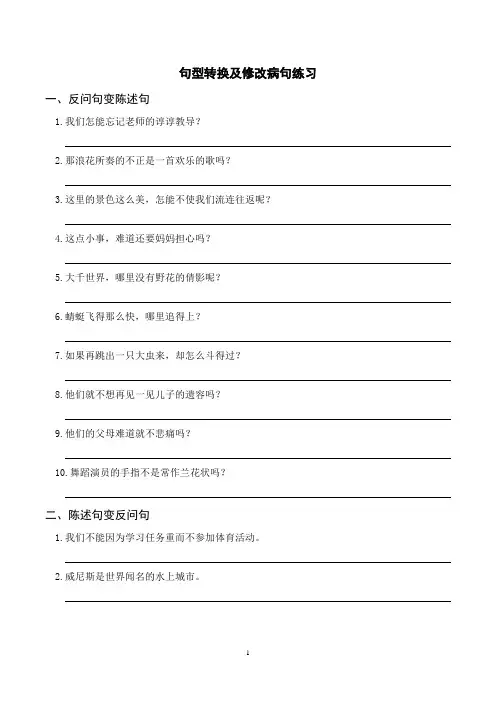
句型转换及修改病句练习一、反问句变陈述句1.我们怎能忘记老师的谆谆教导?2.那浪花所奏的不正是一首欢乐的歌吗?3.这里的景色这么美,怎能不使我们流连往返呢?4.这点小事,难道还要妈妈担心吗?5.大千世界,哪里没有野花的倩影呢?6.蜻蜓飞得那么快,哪里追得上?7.如果再跳出一只大虫来,却怎么斗得过?8.他们就不想再见一见儿子的遗容吗?9.他们的父母难道就不悲痛吗?10.舞蹈演员的手指不是常作兰花状吗?二、陈述句变反问句1.我们不能因为学习任务重而不参加体育活动。
2.威尼斯是世界闻名的水上城市。
3.父母含辛茹苦地把我们养大,我们不应该伤他们的心。
4.对少数同学不守纪律的现象,我们不能不闻不问。
三、改为转述句1.外公对小英说:“我告诉你,这是中国最有名的花。
”2.张强笑着对妈妈说:“李明今天生病了,我去帮他辅导功课。
”3.李老师兴奋地说:“拔河比赛我们班战胜了五(1)班,获得了冠军。
”4.王老师对小华说:“我把你的书包缝好了。
”5.田忌对孙膑说:“想不到你也来挖苦我!”6.小红说:“今天下午学校组织到野外活动,我必须参加。
”7.船长喊道:“向海里跳!快!不跳我就开枪了!”8.我看祖父还在笑,就说:“你不信,我到屋里拿来给你看。
”9.齐威王对田忌说:“怎么,难道你还不服气?”10.小红说:“桂林山水太美了,你们想不想去看?”四、缩句1.远处的几座灯塔在闪烁着微弱的光芒。
2.古老的威尼斯又沉沉地入睡了。
3.小艇穿过一座座形式不同的石桥。
4.语文老师给大家讲了一个关于小红帽打败大灰狼的故事。
5.田忌觉得很扫兴,垂头丧气地准备离开赛马场。
五、修改病句1.春天来了,越来越暖和了。
2.洒在沙滩上,沙滩上一片银白。
3.学了《自相矛盾》这一课受到了教育。
4.雷锋全心全意为人民服务的事迹值得大家学习。
5.联欢会上,他首先第一个走上台表演节目。
6.祖父的菜园子里种了樱桃、李子、小白菜等水果。
7.我经常阅读、看科幻小说。
8.松鼠喜欢把窝搭在高大的大树上。
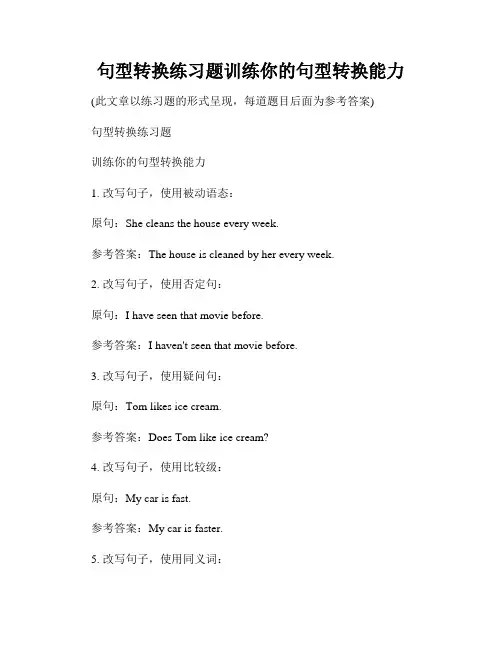
句型转换练习题训练你的句型转换能力(此文章以练习题的形式呈现,每道题目后面为参考答案)句型转换练习题训练你的句型转换能力1. 改写句子,使用被动语态:原句:She cleans the house every week.参考答案:The house is cleaned by her every week.2. 改写句子,使用否定句:原句:I have seen that movie before.参考答案:I haven't seen that movie before.3. 改写句子,使用疑问句:原句:Tom likes ice cream.参考答案:Does Tom like ice cream?4. 改写句子,使用比较级:原句:My car is fast.参考答案:My car is faster.5. 改写句子,使用同义词:原句:The weather is nice today.参考答案:The weather is pleasant today.6. 改写句子,使用定语从句:原句:The book on the table is mine.参考答案:The book that is on the table is mine.7. 改写句子,使用祈使句:原句:Please close the door.参考答案:Close the door.8. 改写句子,使用现在进行时:原句:I read a book.参考答案:I am reading a book.9. 改写句子,使用反意疑问句:原句:You don't like coffee, do you?参考答案:You like coffee, don't you?10. 改写句子,使用条件句:原句:If it rains, I will stay at home.参考答案:I will stay at home if it rains.11. 改写句子,使用间接引语:原句:He said, "I will come tomorrow."参考答案:He said that he would come the next day.12. 改写句子,使用比较疑问句:原句:She likes apples better than oranges, doesn't she?参考答案:She likes apples better than oranges, doesn't she?13. 改写句子,使用虚拟语气:原句:It's time for you to go to bed.参考答案:It's time that you went to bed.14. 改写句子,使用倒装句:原句:I never saw such a beautiful sunset before.参考答案:Never before did I see such a beautiful sunset.15. 改写句子,使用感叹句:原句:What a lovely song she is singing!参考答案:She is singing such a lovely song!通过以上的句型转换练习题,你能提高你的句型转换能力。
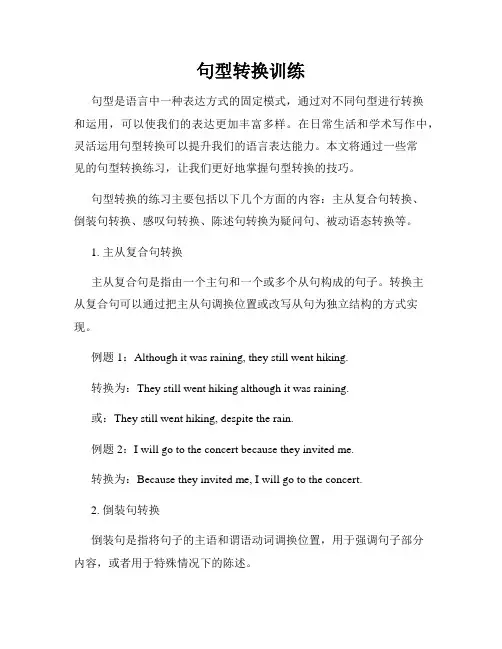
句型转换训练句型是语言中一种表达方式的固定模式,通过对不同句型进行转换和运用,可以使我们的表达更加丰富多样。
在日常生活和学术写作中,灵活运用句型转换可以提升我们的语言表达能力。
本文将通过一些常见的句型转换练习,让我们更好地掌握句型转换的技巧。
句型转换的练习主要包括以下几个方面的内容:主从复合句转换、倒装句转换、感叹句转换、陈述句转换为疑问句、被动语态转换等。
1. 主从复合句转换主从复合句是指由一个主句和一个或多个从句构成的句子。
转换主从复合句可以通过把主从句调换位置或改写从句为独立结构的方式实现。
例题1:Although it was raining, they still went hiking.转换为:They still went hiking although it was raining.或:They still went hiking, despite the rain.例题2:I will go to the concert because they invited me.转换为:Because they invited me, I will go to the concert.2. 倒装句转换倒装句是指将句子的主语和谓语动词调换位置,用于强调句子部分内容,或者用于特殊情况下的陈述。
例题1:She opened the door, revealing a surprise.转换为:Revealing a surprise, she opened the door.例题2:Not only did he finish the project on time, but also he exceeded our expectations.转换为:Not only he finished the project on time, but also he exceeded our expectations.3. 感叹句转换感叹句是表达强烈情感或惊奇的句子,通过转换可以改变句子的句调和表达方式。
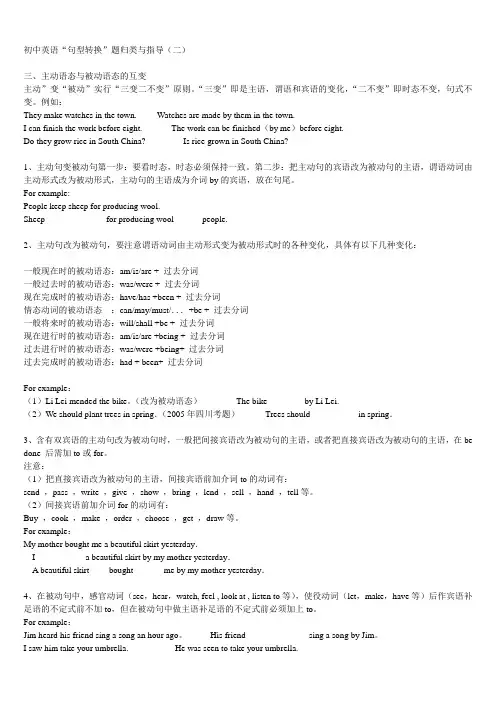
初中英语“句型转换”题归类与指导(二)三、主动语态与被动语态的互变主动”变“被动”实行“三变二不变”原则。
“三变”即是主语,谓语和宾语的变化,“二不变”即时态不变,句式不变。
例如:They make watches in the town.-------Watches are made by them in the town.I can finish the work before eight.----------The work can be finished(by me)before eight.Do they grow rice in South China?-------------Is rice grown in South China?1、主动句变被动句第一步:要看时态,时态必须保持一致。
第二步:把主动句的宾语改为被动句的主语,谓语动词由主动形式改为被动形式,主动句的主语成为介词by的宾语,放在句尾。
For example:People keep sheep for producing wool.Sheep ______ _______for producing wool ______people.2、主动句改为被动句,要注意谓语动词由主动形式变为被动形式时的各种变化,具体有以下几种变化:一般现在时的被动语态:am/is/are + 过去分词一般过去时的被动语态:was/were + 过去分词现在完成时的被动语态:have/has +been + 过去分词情态动词的被动语态:can/may/must/...+be + 过去分词一般将来时的被动语态:will/shall +be + 过去分词现在进行时的被动语态:am/is/are +being + 过去分词过去进行时的被动语态:was/were +being+ 过去分词过去完成时的被动语态:had + been+ 过去分词For example:(1)Li Lei mended the bike。
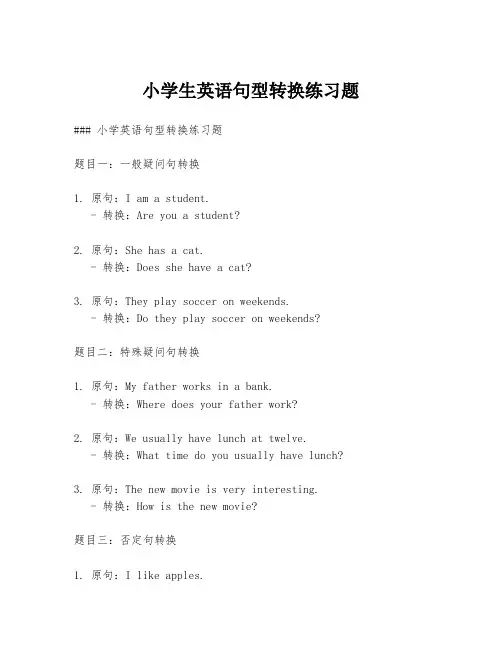
小学生英语句型转换练习题### 小学英语句型转换练习题题目一:一般疑问句转换1. 原句:I am a student.- 转换:Are you a student?2. 原句:She has a cat.- 转换:Does she have a cat?3. 原句:They play soccer on weekends.- 转换:Do they play soccer on weekends?题目二:特殊疑问句转换1. 原句:My father works in a bank.- 转换:Where does your father work?2. 原句:We usually have lunch at twelve.- 转换:What time do you usually have lunch?3. 原句:The new movie is very interesting.- 转换:How is the new movie?题目三:否定句转换1. 原句:I like apples.- 转换:I don't like apples.2. 原句:She can swim.- 转换:She can't swim.3. 原句:They are at home.- 转换:They are not at home.题目四:陈述句转换为一般疑问句1. 原句:The cat is under the table.- 转换:Is the cat under the table?2. 原句:He is doing his homework.- 转换:Is he doing his homework?3. 原句:We are going to the park tomorrow.- 转换:Are you going to the park tomorrow? 题目五:陈述句转换为否定句1. 原句:She watches TV every evening.- 转换:She doesn't watch TV every evening.2. 原句:They are playing basketball.- 转换:They are not playing basketball.3. 原句:I have a new book.- 转换:I don't have a new book.题目六:反意疑问句1. 原句:He is a good student, isn't he?- 转换:He isn't a good student, is he?2. 原句:She can speak English, can't she?- 转换:She can't speak English, can she?3. 原句:They are going to the concert, aren't they?- 转换:They aren't going to the concert, are they?题目七:被动语态转换1. 原句:We make the cake.- 转换:The cake is made by us.2. 原句:They clean the room.- 转换:The room is cleaned by them.3. 原句:She writes a letter.- 转换:A letter is written by her.题目八:条件句转换1. 原句:If it rains, we will stay at home.- 转换:We will stay at home if it rains.2. 原句:If she has time, she will help us.- 转换:She will help us if she has time.3. 原句:If they finish their homework, they can go out. - 转换:They can go out if they finish their homework.通过这些练习题,小学生可以更好地掌握英语句型的转换,提高语言运用的灵活性和准确性。
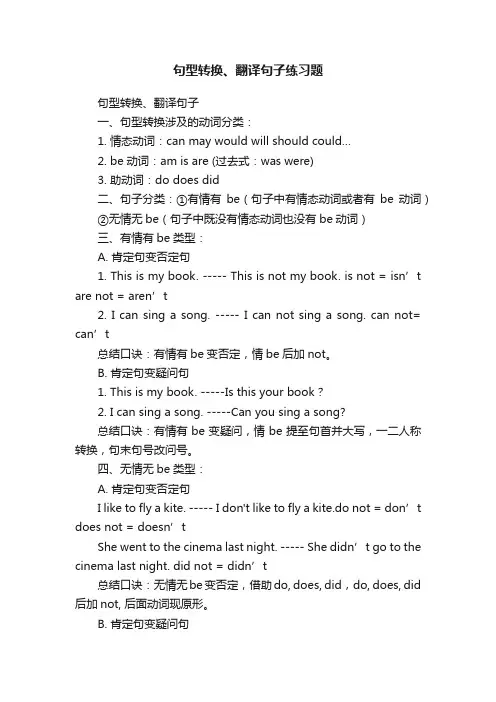
句型转换、翻译句子练习题句型转换、翻译句子一、句型转换涉及的动词分类:1. 情态动词:can may would will should could…2. be动词:am is are (过去式:was were)3. 助动词:do does did二、句子分类:①有情有be(句子中有情态动词或者有be动词)②无情无be(句子中既没有情态动词也没有be动词)三、有情有be类型:A. 肯定句变否定句1. This is my book. ----- This is not my book. is not = isn’t are not = aren’t2. I can sing a song. ----- I can not sing a song. can not= can’t总结口诀:有情有be变否定,情be后加not。
B. 肯定句变疑问句1. This is my book. -----Is this your book?2. I can sing a song. -----Can you sing a song?总结口诀:有情有be变疑问,情be提至句首并大写,一二人称转换,句末句号改问号。
四、无情无be类型:A. 肯定句变否定句I like to fly a kite. ----- I don't like to fly a kite.do not = don’t does not = doesn’tShe went to the cinema last night. ----- She didn’t go to the cinema last night. did not = didn’t总结口诀:无情无be变否定,借助do, does, did,do, does, did 后加not, 后面动词现原形。
B. 肯定句变疑问句I like to fly a kite.----- Do you like to fly a kite?She went to the cinema last night. ----- Did she go to the cinema last night?总结口诀:无情无be变疑问,借助do, does, did,do, does, did 提至句首并大写,一二人称转换,后面动词现原形,句末句号改问号。
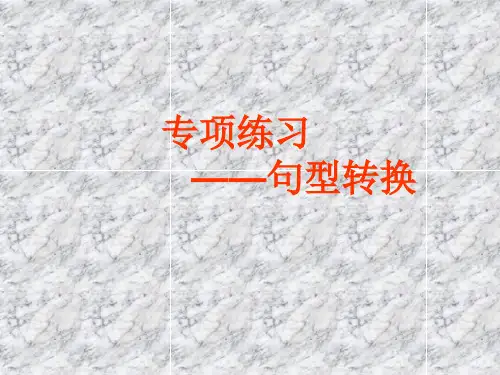
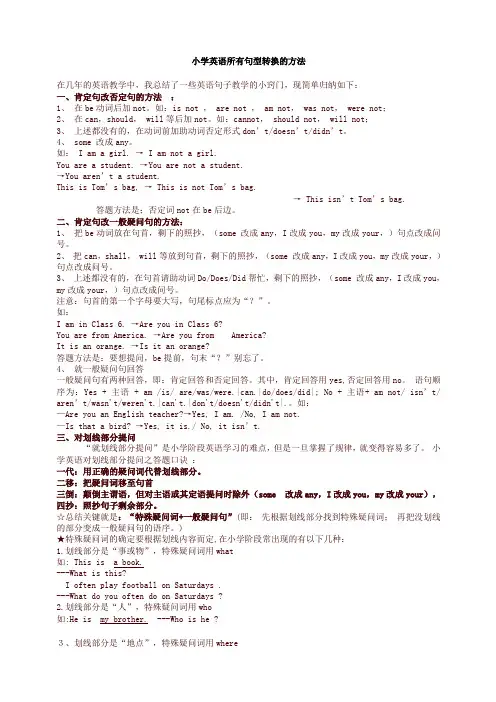
小学英语所有句型转换的方法在几年的英语教学中,我总结了一些英语句子教学的小窍门,现简单归纳如下:一、肯定句改否定句的方法:1、在be动词后加not。
如:is not , are not , am not, was not, were not;2、在can,should, will等后加not。
如:cannot, should not, will not;3、上述都没有的,在动词前加助动词否定形式don’t/doesn’t/didn’t。
4、 some 改成any。
如: I am a girl. → I am not a girl.You are a student. →You are not a student.→You aren’t a student.This is Tom’s bag, → This is not Tom’s bag.→ This isn’t Tom’s bag.答题方法是;否定词not在be后边。
二、肯定句改一般疑问句的方法:1、把be动词放在句首,剩下的照抄,(some 改成any,I改成you,my改成your,)句点改成问号。
2、把can,shall, will等放到句首,剩下的照抄,(some 改成any,I改成you,my改成your,)句点改成问号。
3、上述都没有的,在句首请助动词Do/Does/Did帮忙,剩下的照抄,(some 改成any,I改成you,my改成your,)句点改成问号。
注意:句首的第一个字母要大写,句尾标点应为“?”。
如:I am in Class 6. →Are you in Class 6?You are from Ame rica. →Are you from America?It is an orange. →Is it an orange?答题方法是:要想提问,be提前,句末“?”别忘了。
4、就一般疑问句回答一般疑问句有两种回答,即:肯定回答和否定回答。
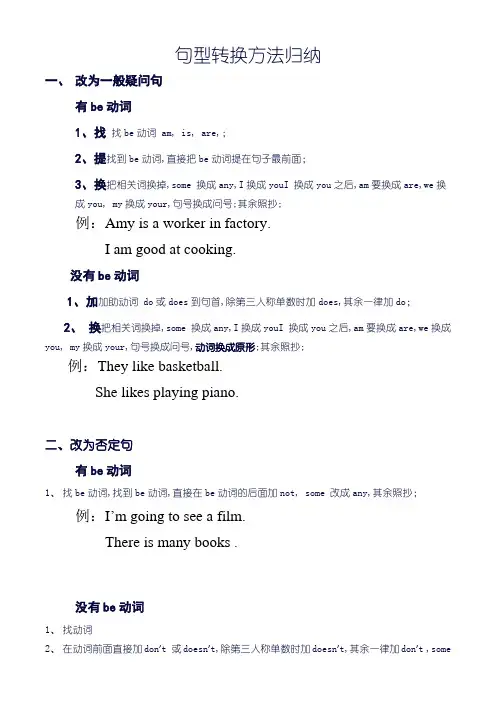
句型转换方法归纳一、改为一般疑问句有be动词1、找找be动词 am, is, are,;2、提找到be动词,直接把be动词提在句子最前面;3、换把相关词换掉,some 换成any,I换成youI 换成you之后,am要换成are,we换成you, my换成your,句号换成问号;其余照抄;例:Amy is a worker in factory.I am good at cooking.没有be动词1、加加助动词 do或does到句首,除第三人称单数时加does,其余一律加do;2、换把相关词换掉,some 换成any,I换成youI 换成you之后,am要换成are,we换成you, my换成your,句号换成问号,动词换成原形;其余照抄;例:They like basketball.She likes playing piano.二、改为否定句有be动词1、找be动词,找到be动词,直接在be动词的后面加not, some 改成any,其余照抄;例:I’m going to see a film.There is many books .没有be动词1、找动词2、在动词前面直接加don’t 或doesn’t,除第三人称单数时加doesn’t,其余一律加don’t ,some改成any,动词换成原形,其余部分照抄;例:I like apple.He takes some pictures every day.三、对划线部分提问第一步:先把句子改成一般疑问句第二步:改提问部分1.看看疑问部分是什么内容;2.找找相应的疑问词,相应的疑问词如下:What →什么How →怎么样Where →什么地方When →什么时候How many →多少How much →多少钱例:She is nice.He likes drawing.I eat some bread.注意:如果提问部分是动词词组,加疑问词之后,还要在提问部分原来的地方加do 例:We are going to take a trip.一,对下列句子中划线部分提问1,The deepest part最深的部分of the water is near Japan.______________________________________________________________ 2,My trip to Xi’an is great.______________________________________________________________ 3,I’m looking for a dress.______________________________________________________________ 4,I saw many animals in Beijing Zoo.______________________________________________________________ 5,I often help my grandfather on the farm.______________________________________________________________ 6,I am from Australia.______________________________________________________________ 7,My new pencil-box is about ten yuan.______________________________________________________________ 8,The name of the book is Sleeping Beauty.______________________________________________________________ 9,He came to visit China two days ago.______________________________________________________________ 10,These sneakers are 280 yuan.______________________________________________________________ 11,I get up at 6 o’clock every morning.______________________________________________________________ 12,Tom saw many places of interest名胜古迹in that old city.______________________________________________________________ 13,I come here by train.______________________________________________________________ 14,We are going to buy tomorrow’s air tickets.______________________________________________________________ 15,My father works in Africa.______________________________________________________________二,把下列句子变为一般疑问句:1. I am good at swimming.______________________________________________________ 2. Mike is a student in Grade Six.______________________________________________________ 3. Tom likes listening to the music______________________________________________________ come to visit China.______________________________________________________ 5. They like making the cakes.______________________________________________________ 10. Jim helps his grandfather on the farm after school.______________________________________________________ 11. He wants to be an actor演员in the future将来.______________________________________________________ play basketball on Sundays.______________________________________________________ 15. The girls are singing in the classroom.______________________________________________________ 17. The little boy is standing on the man's shoulders.______________________________________________________ is some fruit juice in the glass.______________________________________________________ 三,将下列句子变为否定句:takes some pictures every day.______________________________________________________ me your library card, please.______________________________________________________ are a lot of lovely animals there.______________________________________________________。
小学英语试题-句型转换的方法一、肯定句改否定句的方法——一步法1、在be动词后加not。
如:is not ,are not ,am not,was not,were not;2、在can,should,will等后加not。
如:cannot,should not,will not;3、上述都没有的,在动词前加助动词否定形式don’t/doesn’t/didn’t。
4、some 改成any。
如有I、you将其该成you、I。
二、肯定句改一般疑问句的方法——三步法1、把be动词放在句首,剩下的照抄,(some 改成any,my改成your等)句点改成问号。
2、把can,shall,will等放到句首,剩下的照抄,(some 改成any,my改成your等)句点改成问号。
3、上述都没有的,在句首请助动词Do/Does/Did帮忙,剩下的照抄,(some 改成any,my改成your等)句点改成问号。
三、肯定句改特殊疑问句的方法——四步法1、在一般疑问句的基础上,句首添加一个疑问词即可,可根据划线部分确定是什么疑问词。
2、接着找be动词或can,shall,will等放在疑问词后面,若没有则请助动词do/does/did 帮忙,写在疑问词后面,how many除外,必须先写物品,再写be动词等。
3、划线部分去掉后剩下的内容照抄,(some 改成any,my改成your等)4、句点改成问号。
如:what (什么)\how(怎样)\ who(谁)\ which(哪一个)\why(为什么)where(哪里)how many(多少)\how much (多少钱)\what colour(什么颜色)\ how old(多大)\……等等……一、把be动词(am is are)和情态动词(can, may, must...)放到句首,其它照写。
遇I/we—you, my—your. some—any. 句号变成问号(?)例如:陈述句: They are in the park. He can play the guitar..一般疑问句: Are they in the park? Can he play the guitar?把下列句子变成一般疑问句1. I am listening to music.____________________________________2. Mike is a student.__________________________________________3. Sarah can clean the classroom.________________________________4. They are in the zoo.________________________________________5. There are some flowers in the vase.__________________________6.This is my sister._________________________________________ ___7.We are sweeping the floor._________________________ _________二、借助助动词do/does,第三人称单数用does,其余人称用do,放到句首,其他照写。
小学英语句型转换肯定句改否定句的方法(一加二改)1、在be动词或情态动词后加not。
如:is not ,are not ,am not,was not,were not,cannot,should not,will not;2、上述都没有的,在动词原型前加助动词否定形式didn’t/doesn’t/ don’t 。
3、some改any,too改either,and改or一般疑问句(一跳二改三问号)1.跳be动词(am is are was were)或情态动词(can may must shall should would could will) .没有就在加上助动词did does do2.改大小写,动词改原型,some改any,I 改you,my 改your .3.句号改问号对画线部分提问(一定二问)1.根据划线的词语选用特殊疑问词,放在句首,进行提问。
2. 加上一般疑问句(一跳二改三问号)特殊疑问词一般是w或wh开头的。
如:wh at -------------------------- 什么,对名词和职业提问如a jacketwhat…do/doing--------------做什么,对动词提问如sweep the floorwhat colour--------------------什么颜色what day-----------------------星期几how -----------------------怎样,对方式和感觉如何提问,如fine, by bus, walkwh o------------------------------谁, 对人提问Miss Li, my motherwh ose+名词--------谁的,对名词所有格和物主代词提问,如Lily’s, mine, hiswhere----------------------------哪里,对地点提问, 如at schoolwhen-----------------------------什么时间,对时间提问,如at half past fivehow many+名词复数---------多少,对数量提问,如twenty, fivehow much----------------------多少,对不可数名词和价格提问how old------------------------多少岁which+名词-------------------哪一个,对形容词提问,如I like the big ball.Why-----------------------------为什么一、将下列句子改为否定句1、I have a soccer, too.2、She has some apples.3、Please don’t open the window.4、Bill doesn’t like bananas.5、I ate ice cream for lunch.二、对画线部分提问。
英语句形转换练习题句形转换是英语学习中的重要环节,通过改变句子的结构和表达方式,有助于提升语言的灵活运用和表达能力。
下面是一些英语句形转换的练习题,帮助大家熟悉不同类型的句子转换。
请根据题目要求,进行句形转换,并写出转换后的句子。
题目一:改写句子类型(陈述句、疑问句、祈使句)1. She is a doctor.(改写为一般疑问句)2. Don't smoke in the room.(改写为陈述句)3. Can you lend me your pen?(改写为陈述句)4. What's your name?(改写为祈使句)题目二:改变句子时态1. I will meet you tomorrow.(改写为过去时)2. They have already finished their homework.(改写为将来时)3. She is reading a book.(改写为过去进行时)4. I have been to Paris before.(改写为现在完成时)题目三:改写句子语态1. They clean the classroom every day.(改写为被动语态)2. Someone stole my bicycle.(改写为被动语态)3. They are building a new house.(改写为被动语态)4. She has written a letter.(改写为被动语态)题目四:改变句子结构1. I bought a new car with my savings.(用不定式短语作状语改写)2. She opened the door and went out.(用并列句改写)3. Although it was raining, we still went for a walk.(用状语从句改写)4. He is a student. He studies at Harvard University.(用定语从句改写)题目五:句型转换1. She is a student. She studies in Beijing.(合并成一个复合句)2. He works hard. He wants to succeed.(合并成一个复合句)3. I arrived at the station. I saw the train leaving.(合并成一个复合句)4. Mary walked to the park. She met her friends there.(合并成一个复合句)以上是英语句形转换的练习题,通过不断练习,可以提高我们的英语语言表达能力,让我们的句子更加准确流畅。
四年级英语句型转换练习30题1. He is a student. (改为一般疑问句)答案:Is he a student? 解析:陈述句变一般疑问句,将be 动词is 提到句首,句末用问号。
2. They are in the classroom. (改为一般疑问句)答案:Are they in the classroom? 解析:同样将be 动词are 提到句首。
3. She has a pen. (改为一般疑问句)答案:Does she have a pen? 解析:此句has 是实义动词“有”,变为一般疑问句时,需借助助动词does,has 变为have。
4. I like apples. (改为一般疑问句)答案:Do you like apples? 解析:句中like 是实义动词,借助助动词do,I 变为you。
5. We play football on Sundays. (改为一般疑问句)答案:Do you play football on Sundays? 解析:play 是实义动词,借助助动词do,we 变为you。
6. She is a teacher. (对划线部分提问)答案:What is she? 解析:划线部分是“a teacher”,表示职业,所以用“What is she?”来提问。
7. I have a pen. (对划线部分提问)答案:What do you have? 解析:划线部分是“a pen”,是物品,用“What do you have?”询问。
8. They are in the classroom. (对划线部分提问)答案:Where are they? 解析:划线部分“in the classroom”是地点,用“Where are they?”提问。
9. He likes apples. (对划线部分提问)答案:What does he like? 解析:划线部分“apples”是物品,用“What does he like?”来问。
(一)肯定句转换为否定句的规则: 1、首先看句子中是否有情态动词can ,may ,must, could, should, would或 will等词中的任何一个。如果有,则在该词后面加上 not ,句子其余部分都不变,原肯定句就变成了否定句。
例:(1)I can swim. →否定句:I can not swim. (2)We will go to Beijing tomorrow. →否定句:We will not go to Beijing tomorrow. 或We won’t go to Beijing tomorrow. 2、其次,如果句中无上述情态动词,则看句中是否有be动词的各种形式如is ,am ,are或was , were 中的任何一个。如果有,则在该词后面加上not ,句子其余部分都不变,原肯定句就变成了否定句。
例:(1)This is my book. →否定句:This is not my book. (2)They are pandas. →否定句:They are not pandas. 3、如果句子中没有如上述1、2所列的动词,则先找出句中的动词。 (1)如果句中动词为原形,则在该动词前面加don’t ,句子其余部分都不变,原肯定句就变成了否定句。
例:We like English. →否定句:We don’t like English. (2)如果句中动词为第三人称单数形式,则在该动词前面加doesn’t,之后动词变为原形,句子其余部分都不变,原肯定句就变成了否定句。
例:He likes English. →否定句:He doesn’t like English. (3)如果句中动词为过去式,则在该动词前面加didn’t,之后动词变为原形,句子其余部分都不变,原肯定句就变成了否定句。
例:We liked English. →否定句:We didn’t like English.
(二)肯定句转换为一般疑问句的规则: 1、首先看句子中是否有情态动词can ,may ,must, could, should,would或 will等词中的任何一个。如果有,则将该词提到句子开头 ,句子其余部分都不变,句尾加“?”,原肯定句就变成了一般疑问句。
例:(1)He can swim. →疑问句:Can he swim? (2)He would like to go swimming. →疑问句:Would he like to go swimming? 2、其次,如果句中无上述所列的情态动词,则看句中是否有be动词的各种形式,如is ,am ,are或 was , were 中的任何一个。如果有,则将该词提到句子开头,句子其余部分都不变,句尾加“?”,原肯定句就变成了一般疑问句。
例:These are computers. →疑问句:Are these computers? 3、如果句子中没有如上述1、2所列的动词,则先找出句中的动词。 (1)如果句中动词为原形,则在句首加Do,其余部分都不变,句尾加“?”,原肯定句就变成了一般疑问句。
例:They like English. →一般疑问句:Do they like English? (2)如果句中动词为单三形式,则在句首加Does,动词单三形式变为原形,句子其余部分都不变,句尾加“?”,原肯定句就变成了一般疑问句。
例:He likes English. →一般疑问句:Does he like English? (3)如果句中动词为过去式,则在句首加Did,动词过去式变为原形,句子其余部分都不变,句尾加“?”,原肯定句就变成了一般疑问句。
例:They liked English. →一般疑问句:Did they like English?
(三)肯定句转换为特殊疑问句的规则: 1. 先把陈述句变成一般疑问句. 例:She likes red. —Does she like red? 2. 选择代替划线部分的疑问词放在一般疑问句之前,去掉划线部分。 对颜色提问应用What colour —What colour does she like? 3. 如果划线部分是动词还要加一个do的适当形式。 I like swimming in summer. —Do you like swimming in summer? —What do you like doing in summer? 一、 陈述句便否定句 1. We are in the same class.(改为否定句) 2. There are some apples on the trees.(改为否定句) 3.There are some apples on the tree.(否定式) 4.The book is in my schoolbag.(变否定句) 5. My brother and I are strong. (改为否定句) 6.We can speak good English.(变否定句) 7. I can see some bread and milk on the table. (否定句) 8. I can fly a kite.(改为否定句) 9.I will go to school by bus. 10. Li Ming and Danny like going skating.(改为否定句) 11. Uncle Li likes making things. (否定句) 12. Danny watches TV every evening.(改为否定句) 13. He speaks English very well.(改为否定句) 14. They have nice kites.(改为否定句) 15. I have some good news for you . (改为否定句) 16. We go to school every morning.(改为否定句) 17.I think he is very old.(否定句) 18.Please colour it green.(否定句) 19.Put on your coat, please. (否定句) 20. Open the door, please.(改为否定句) 二、陈述句便一般疑问句: 1. She is always a good student.(改为一般疑问句,作否定回答) 2. There are some balls under the bed. (一般疑问句) 3. There is a cat under the tree. (一般疑问句) 4. There are some oranges on the table.(一般疑问句) 5. There is some money in the box. (一般疑问句) 6. You are a good boy. (一般疑问句) 7. We are reading books. (一般疑问句) 8. 8.I am a studeng. (改为一般疑问句,作否定回答) 9. This is a pen. (改成一般疑问句) 10. There is a computer in my house.(一般疑问句) 11. There are some flowers on the teachers’desk.(一般疑问句) 12. My mother is a teacher. (改为一般疑问句,作肯定回答) 13. That is my book. (改为一般疑问句,作肯定回答) 14. They can stay at home for two days.(改成一般疑问句) 15. I can draw a picture. (一般疑问句) 16. We can see some birds.(一般疑问句) 17. I would like a hot dog. (改成一般疑问句) 18. He will go to the park. (改为一般疑问句,作否定回答) 19. My mother likes to read books. 20. We have many friends in China.(改成一般疑问句) 21. Kate helps her mother with housework.(改成一般疑问句) 22. I do my homework every day.(改为一般疑问句,作否定回答) 23. She likes milk.(改为一般疑问句,作肯定回答) 24. Amy likes playing computer games.(改为一般疑问句,作否定回答) 25. He often does his homework in the evening.(一般疑问句) 26. My aunt goes to work by bike. (改成一般疑问句) 27. She plays ping-pong with me. (改成一般疑问句) 28. Li Ming works hard at school. (改成一般疑问句) 29. We go to the gym on Sundays. (改为一般疑问句,作肯定回答) 30. They have fun together. (改为一般疑问句,作否定回答) 31. We go to school by bike every day.(改为一般疑问句并做肯定回答) 32. They play tennis at school in the afternoon. (改为一般疑问句并做否定回答) 33. He takes a bus to school. (改为一般疑问句并做肯定回答) 34. Daniel has a cousin. (改为一般疑问句并做否定回答) 35. I do my homework every day. (改为一般疑问句并做肯定回答) 36. She likes milk. (改为一般疑问句并做否定回答) 三、就划线部分提问: (一)What------事情、样色、东西、职业,名称